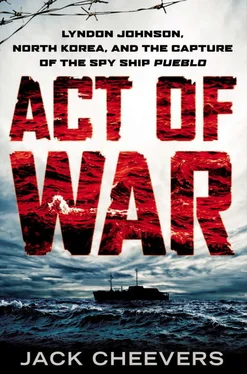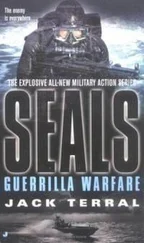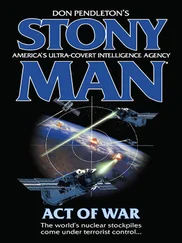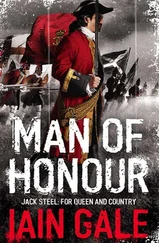The son of a general-store proprietor, Murphy had grown up in the lumber town of Arcata in Northern California’s redwood country. After college, he enrolled in officer candidate school in Newport, Rhode Island. Posted to a fleet oiler, he later served on a destroyer as assistant navigator, earning good fitness reports.
Murphy liked the Navy and wanted to make it his career. In 1964, he was assigned, as a full-fledged navigator, to a guided missile destroyer in the Tonkin Gulf. By then his father had died and his mother was trying to run the family store herself. That became more and more difficult as her health deteriorated. In 1965, Murphy made a difficult decision to put his shipboard career on hold and got a humanitarian transfer to a small Navy shore facility near Arcata. During off hours, he helped his mother get the store ready to sell.
Murphy might be straitlaced, but he had mettle. Walking along the beach near the base one winter morning, he and another lieutenant spotted a foundering crab boat getting knocked to pieces in heavy surf. At first the officers thought the vessel was abandoned. Coming closer, they saw three men aboard. Murphy and his colleague plunged into the frigid ocean, swam to the boat, and hauled the crabbers to shore. For risking their lives, both officers were awarded the Navy and Marine Corps Medal.
From his first moments aboard the Pueblo , however, Murphy rubbed Bucher the wrong way. The lieutenant prissily turned down a cup of coffee, saying, “I never use it, thank you,” as if he’d been offered a bowl of opium. When the wardroom retired that afternoon to the Bremerton officers’ club to toast the new executive officer with martinis, Murphy sipped a ginger ale and left early.
Bucher believed that compatibility was as important as competence among officers on a small ship. Murphy certainly wasn’t very compatible with the captain’s style of hard work and boozy hard play. To Bucher, the XO seemed unable to cope with his paperwork or carry out shipboard policies. Nor did he join the other officers in their frequent beer-and-bull sessions after work. He seemed preoccupied with his family, especially his mother’s ongoing difficulties with the store.
More and more, the exec found himself cut out of the wardroom loop. In port, Bucher often made decisions about ship’s business while out on the town with his more convivial officers. Murphy didn’t find out until he tried to give someone an order later, only to be told, “The captain said we weren’t going to do that.”
Bucher also regularly embarrassed Murphy by dressing him down—“chewing ass,” the captain called it—within earshot of others. Murphy felt his boss was obsessed with his refusal to consume alcohol, seeing it as a sign that the executive officer regarded himself as morally superior. Murphy considered that ridiculous; he was simply living the tenets of his faith, not turning up his nose at anyone else.
How to run the ship was another source of friction between the two men. Murphy disliked the skipper’s tendency to act as if the Pueblo were a submarine instead of a surface vessel. He referred to the flying bridge as the “conning tower” and the crew’s mess area as the “after battery.” Murphy approved of some of Bucher’s sub-style practices, such as the midafternoon “soup down,” which let the men put something hot in their stomachs before going on the four-to-eight-p.m. watch. But the captain, a confirmed night owl, also canceled reveille, routinely held on surface ships but not on subs, whose crews can’t usually be lined up on deck for head counts. Murphy thought eliminating reveille made it more difficult to get the Pueblo ’s men up for morning work details.
Bucher’s vexation with his second in command peaked just before Thanksgiving, as the ship snorted and churned its way toward Japan.
Murphy had been aware for some time that the cooks were using bourbon and wine to prepare some meals. Thinking Bucher was trying to bait him, the exec said nothing. Before setting sail, the skipper had tripled the Pueblo ’s alcohol allowance. Murphy didn’t question that; nor did he complain of the frequency with which liquor was broken out for nonmedicinal purposes. What Bucher and the others drank was their business.
Shortly before the holiday, the officers were chatting in the wardroom when Tim Harris suggested that the mincemeat pies be laced with brandy. Suspecting a trap, Murphy didn’t object. Then Schumacher piped up, asking what the lieutenant thought should be done. Murphy, a big fan of mincemeat, peered through his glasses and said perhaps a compromise was in order. All the holiday pies could be spiked save one, for those who might want a nonalcoholic dessert.
“Hell, no!” Bucher roared. “We’ll put brandy in all the pies, and that’s that!”
On Thanksgiving, Murphy took a pass on the mincemeat.
In the final week of its voyage, the Pueblo ran into gale-force winds and mountainous seas. It rolled as much as 50 degrees, so far over that Bucher feared a fatal capsize. Pots, pans, and plates flew every which way in the galley; green-gilled CTs pressed themselves tighter into their bunks. In spite of all the trouble with the steering engine, the main engines functioned flawlessly. The ship crawled up and over row after row of towering graybeards.
Finally, on December 1, the main Japanese island of Honshu appeared. The Pueblo rounded Cape Nojima and cruised past the long headland that protects the entrance to Tokyo Bay. Darkness had fallen by the time the storm-lashed ferret entered the Yokosuka channel, bound for its new home. Every man not on duty came out on deck, gazing eagerly at the bright lights of shore.
Bucher felt a flush of satisfaction at having finished his first sea journey as a commander. He had many sub buddies in Yokosuka and he was determined to impress them by gliding to a perfect stop at his designated dock. But he blew it, chugging right past the berth. Realizing his error, he threw the twin diesels into reverse. The steering engine chose that moment to quit completely. Since he didn’t dare approach the dock with only rope-and-tiller steering, the skipper had to call for a tug.
As the spy ship was nursed into its slot, Bucher saw some familiar faces gathered under the pier lights.
They were laughing at him.
CHAPTER 2
DON’T START A WAR OUT THERE, CAPTAIN
Five days before Christmas, the USS Banner —the first spy ship sent out under Operation Clickbeetle—returned to Yokosuka from its latest patrol and tied up next to the Pueblo . After several weeks at sea the Banner ’s unshaven crew looked like tired pirates. Bucher and his men soon would replace them in the wintry Sea of Japan.
Like its sister a onetime freighter, the Banner had ferried coconuts, pigs, and pregnant women around the Mariana Islands for years. In 1965, workmen at Bremerton converted it into a spy platform in just seven weeks—so fast that one Navy officer observed that it had been “literally put together like a plate of hash.”
The Banner ’s first commander was Lieutenant Bob Bishop, a South Carolinian who seemed to possess a sixth sense for extricating himself from white-knuckle situations. His inaugural mission was intended to gauge the Soviets’ reaction to the presence of a lone unarmed intelligence vessel near their shores. And the communists weren’t shy about demonstrating their displeasure.
Their destroyers and patrol boats tried to drive off Bishop by speeding straight at the Banner and swerving away moments before a collision. The harassment didn’t faze the American skipper, but the horrendous weather did. After 20 hours of plowing into a Siberian storm, he realized the Banner had been pushed two miles backward. The storm left so much ice on the ship’s topsides that Bishop worried it might turn turtle.
Читать дальше












